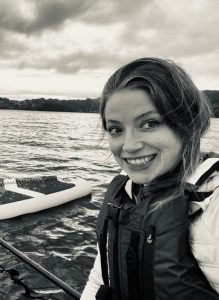Hej hej! My name is Sofie Søderstrøm, and I just started as a postdoctoral research fellow in the Marma-detox project in the Environmental toxicology group here at BIO. Originally from Sweden, I’ve called Bergen home for the past 14 years.
My academic journey has been driven by my fascination with marine life, from majestic creatures like the blue whale to the intricate interactions of toxic substances with cellular processes in marine organisms. My journey began at Lund University, where I earned my BSc in Marine Biology, investigating the impact of antifouling paint on seaweed photosynthesis. I then moved to Norway and completed my first master’s degree in Marine Biology at UoB, focusing on habitat use and interspecific associations within the Northeast Atlantic whale community. After a brief hiatus from academia, I returned to UoB for a second master’s degree in Environmental Toxicology, investigating how PFAS exposure affects lipid metabolism in Atlantic cod through nuclear receptor activation. For my Ph.D., I joined the Marine Toxicology group at IMR, where I studied the effects of aquafeed contaminants (mycotoxin) on Atlantic salmon. Using in vitro and in vivo exposure studies, I began to map out the mycotoxins’ impact on cellular pathways and salmon tissue functions.
Now, as part of the Marma-detox project, I aim to contribute to the decoding and characterization of the chemical defesome of marine mammals living in the Northeast Atlantic. By combining whale fibroblast cell cultures from skin-blubber biopsies, in vitro/ex vivo exposure studies, cellular reprogramming and differentiation, together with in silico methods we hope to gain deeper insights into how environmental contaminants affect whales and polar bears.

